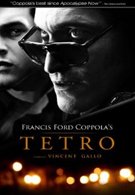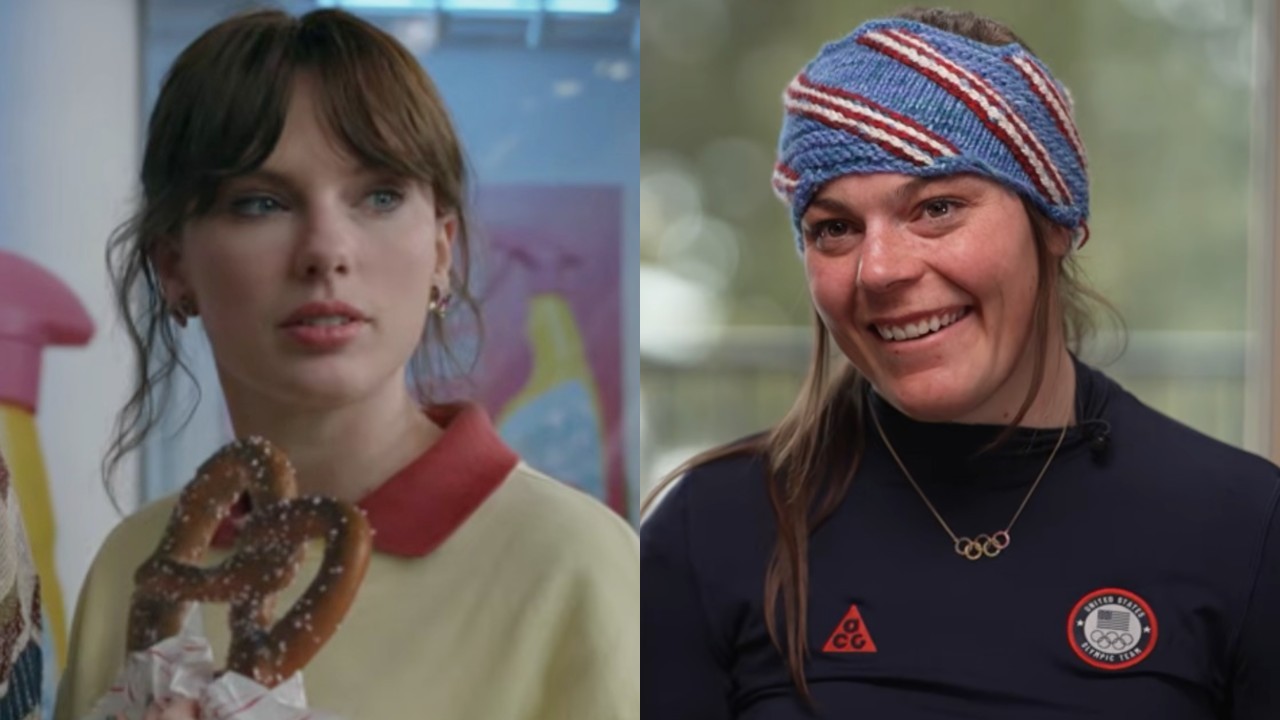On the DVD commentary, Francis Ford Coppola describes his latest works as examples of "personal filmmaking." He uses this label because all of the others have been demonized about as much as the words "socialist," "conservative," or "liberal" in our current political climate. What would've been proudly presented as an "art film" or "experimental film" in the 1960s, or as an "independent film" in the 1990s, would be seen as something much more obscure if labeled as such today. "Personal filmmaking" best describes what Coppola is doing now. At age 70, the writer-director is making modestly budgeted films on his own terms, financed by his successful wine business. The "personal" label separates his last two films from his previous career as one of the key figures of what he refers to as "industrialized film." Both Youth Without Youth and his latest film, the wonderful Tetro, are not so much experimental or arty as they are personal. Tetro in particular seems to be about as personal a film he could make without producing a documentary called Coppola. That said, this isn't the story of a wildly ambitious filmmaking family, but it is a film about art and how the art is often inseparable from the artist. Beautifully shot in crisp black and white by cinematographer Mihai Malaimare Jr., Tetro seems to be a product of another era. While the visuals echo the work of filmmakers as diverse as Fellini and Elia Kazan (and at times the Coppola of Rumble Fish), the screenplay is very much in the tradition of '50s poetic drama as defined by writers like Tennessee Williams and Clifford Odets.
Set in a fantasy Buenos Aires of Coppola's mind, the film begins with the arrival of 17-year-old cruise ship waiter Bennie (Alden Ehrenreich) at the apartment of his older half-brother, Angelo. Except the brother is going by the name "Tetro" (Vincent Gallo) these days, an abbreviation of the family name Tetrocini. It's a name Tetro keeps a secret from his "sort of" wife Miranda (Maribel Verdú) and all of their friends because he knows from personal experience how easily people are drawn to success like moths to the flame. Both Bennie and Tetro have come here to step out of the shadow of their overbearing father, Carlo (Klaus Maria Brandauer), a world-renowned composer and conductor. Tetro came to find himself as a writer but ended up losing himself in a mental breakdown. He vowed to give up writing and to divorce himself completely from his past, which is why he is less than pleased with the sudden arrival of brother.
For his part, Bennie wants desperately to reconnect with the older brother he's always admired and to learn more about his family. The boy becomes immersed in the bohemian-theatre world of Tetro and Miranda, and slowly attempts to tear away his brother's cold facade. Discovering Tetro's unfinished and very autobiographical writing hidden away in the apartment, Bennie crafts a plan to finish what his brother started by reshaping the work as a play to compete for top prize in the prestigious local literary festival. Bennie's actions force Tetro to face the tragedies of his past directly and to reveal some startling family secrets.
It would be easy to play Freud and just put the film on the proverbial couch. Cheap points could be racked up by listing the many parallels that exist in Coppola's real life. Certainly among the film's many themes is that of creative jealousy within artistic families and the pressures that hang over each generation to prove their own distinctive genius. But the manner in which Coppola has rendered this theme is much more creative than mere autobiography. Fiction has been wrapped around reality to the point where it would be impossible to say whether Coppola saw himself as Bennie, Tetro, or Carlo. Perhaps it is all three, as Coppola moved to each station with age; beginning as the boy and ending up as the father himself. Like all good fiction, it's a lie about the truth.
Reading the synopsis above makes the film sound like a very old fashioned and predictable melodrama, and on one level that's exactly what it is. There is an intentional naiveté in the storytelling that makes it feel as though it's taking place in the late '50s or '60s. Only the occasional appearance of a cell phone or Macbook snaps us out of the timeless atmosphere. More than the look, however, the film seems to be most influenced by the storytelling styles of that era. As opposed to 95 percent of contemporary filmmaking, the story is actually allowed to breathe and unfold rather than being vomited out in explosions of exposition. We learn about the characters as they learn about each other in a series of well-crafted and often-oblique dialogue scenes. It's an approach that went hand in hand with the rise of method acting and requires more talent than is normally found these days. Luckily, the film is extremely well cast, and Coppola gets great performances from his two very different leads. Newcomer Alden Ehrenreich displays an honesty that's initially quite jarring. Most of what we've come to understand about contemporary acting seems to be about putting on masks, but this young actor seems quite comfortable taking his off. Vincent Gallo, on the other hand, uses his masked, enigmatic persona to keep Tetro just out of reach. It's arguably his best performance. The improvisation he normally indulges in is reined in by Coppola in order to make the actor commit to stronger choices. The result loses nothing in energy that isn't gained by clarity.
Coppola also aids the actors greatly by returning to the relaxed framing style he experimented with around the time of The Conversation and The Godfather Part II . Each scene is set up as a series of static, wide tableaux that allow the viewer to soak in a space before cutting in to closer details. The actors are never trapped within a series of tightly boxed in frames or alternating "big-head" close-ups that leave the final performance to the judgment of the editor.
Finally, what really distinguishes the film is the stylized approach the director brings to the material. Tetro isn't bound by the conventions of realistic drama. It's wonderfully expressionist and surreal, and some of Coppola's riskier ideas pay great dividends by the end of the film. Faced with the problem of presenting the "brilliance" of Tetro's writing, Coppola chooses to abstract it instead in a series of color-ballet sequences that dramatize the central themes of both Tetro's writing and life. This is a much more cinematic idea, and allows music via Tetro's father and dance via Tetro's first love to be expressed in terms more emotional than intellectual. This kind of abstraction also allows the audience to see the "realistic" drama in heightened terms. By casting the image of the father as the "evil" conductor who tragically destroys the lovers in the ballet, the raw truth hidden in Tetro's own life is given a deeper, almost subconscious dimension, the way dreams sometimes reveal deeper truths through abstraction.
Your Daily Blend of Entertainment News
Francis Ford Coppola has contributed some of the most important films of our time, but many filmmakers begin to lose their edge and enthusiasm in their later years. This is why a film like Tetro is so wonderful to experience. The veteran director seems as excited and invigorated by his chosen art form as he was when he began. It will be very interesting to see what more will emerge from this late phase of "personal filmmaking." Tetro has been released to DVD by Lionsgate Home Entertainment in a single disc-edition that is actually packed to the gills with extras. Sound and image are flawless, preserving Walter Murch's fantastic sound mix and the outstanding Tango-inspired score by Osvaldo Golijov. Visually, it's quite possibly the best black-and-white transfer I've ever seen. It's luminous. The only regret is that the color sequences, which were shot at a different ratio, had to be picture-boxed within the letterboxed 2.35:1 frame, rendering them alone in the center of blackness and reducing rather than increasing their impact.
There are no fewer than six featurettes on the making of the film, adding up to almost another hour's worth of material. These cover in great detail the intensive rehearsal process, the creative work of the HD cinematography, the vast amount of footage shot for the ballet sequence, the music scoring, and the intriguing use of a real Buenos Aires psychiatric hospital and patients for a key sequence.
There is much to delve into here. Vincent Gallo expresses his initial apprehension in giving away his performance during the rehearsal process, but eventually he admits that it's a different but valid way of working. Video footage of the rehearsals crosscut with finished scenes shows how the best ideas discovered there ended up in the final film. Coppola's delight at the opportunities provided by blue-screen work is at the center of the ballet featurette. He is amazed at how much can be done in post-production to transform the scenery and seems excited to use it more in the future. Several variations and digital mockups of the sequence are presented to demonstrate the wide range of visual designs that were considered. The cinematography piece presents a thorough examination of the visual plan, with cinematographer Mihai Malaimare Jr. demonstrating how carefully thought out the black-and-white look and framing was from his initial discussions with the director. Tests are included for the film's color flashbacks, which were initially conceived as having a Super-8mm home movie look. This was eventually deemed extreme, but the examples presented are intriguing. The portrait of the psychiatric clinic is fascinating as well. Patients sit outside and are encouraged to express themselves with a microphone while being accompanied by a DJ mixing mood music. The final featurette is the full version of the camp production of "Fausto," of which we see pieces in the film. As usual, Coppola shot it all to give himself the most choices in the cutting room.
Finally, there is the excellent audio commentary by Coppola and star Alden Ehrenreich. Coppola is an old hand at this by now, and if you've ever heard him speak you know that spending two hours with the man talking about life, art, and filmmaking is a gift. It's the cherry on top of a really fine DVD.

